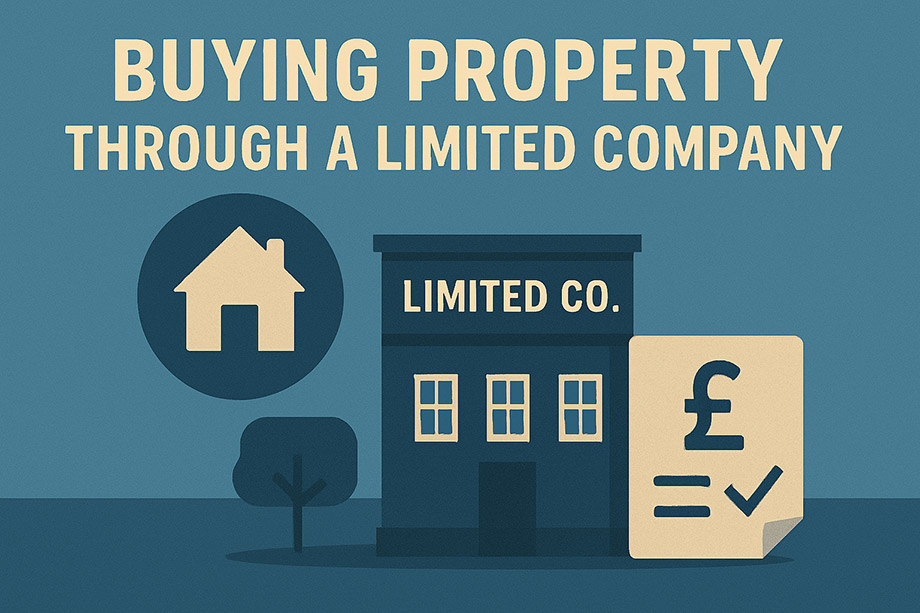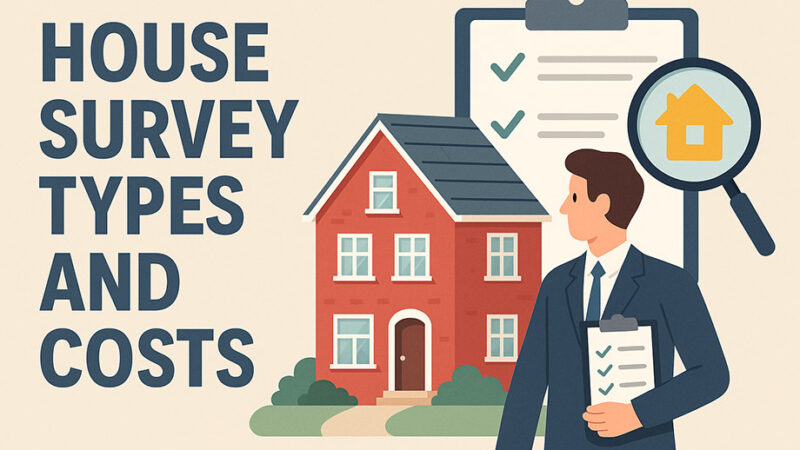Buying Property Through a Limited Company in the UK – A Complete Guide

Buying property through a limited company has become increasingly popular among UK landlords and property investors. This trend accelerated following tax changes in recent years that made individual property ownership less attractive for higher-rate taxpayers.
But is buying through a company right for everyone? In this guide, we’ll explain how it works, the key benefits and drawbacks, and when this approach might make sense for your property investment goals.
What Does Buying Property Through a Limited Company Mean?
When you buy property through a limited company, the company becomes the legal owner of the property – not you personally. You own shares in the company and typically act as a director, but the company holds the property title, receives rental income, and pays all expenses.
This creates a clear separation between your personal assets and your property investments. The company operates as a separate legal entity that can buy, sell, rent out, and manage properties independently.
Many property investors use what’s called a Special Purpose Vehicle (SPV) – a limited company set up specifically for holding rental properties. This keeps property investments separate from any other business activities.
Why Has This Become So Popular?
The main reason for this trend is changes to tax relief on mortgage interest for individual landlords. Before 2020, private landlords could deduct their full mortgage interest payments from rental income before calculating tax.
Now, individual landlords only get a 20% tax credit on mortgage interest – a significant reduction, especially for higher-rate taxpayers. Limited companies, however, can still deduct the full amount of mortgage interest as a business expense.
This means that for many investors, particularly those paying 40% or 45% income tax, buying through a company has become much more tax-efficient than personal ownership.
Advantages of Buying Property Through a Limited Company
Tax Benefits
Full Mortgage Interest Deduction Companies can deduct 100% of mortgage interest payments from rental income as a business expense. This is a major advantage over individual ownership where you’re limited to a 20% tax credit.
Lower Tax Rates Rental profits in a company are subject to corporation tax rather than personal income tax:
- 19% corporation tax on profits up to £50,000
- 25% corporation tax on profits over £250,000
For higher-rate taxpayers (40%) and additional-rate taxpayers (45%), this can result in significant tax savings.
Profit Retention You can keep profits within the company to buy more properties without paying personal income tax on them. This allows for tax-efficient growth of your property portfolio.
Legal Protection
Limited Liability Your personal assets are legally separated from the company’s assets. If the company faces legal claims or debts related to properties, your personal finances are generally protected.
Professional Image Operating through a limited company can make you appear more professional to estate agents, letting agents, and tenants.
Inheritance Planning
Easier Succession Instead of transferring individual properties, you can transfer company shares to family members. This can simplify inheritance planning and may offer tax advantages.
Business Property Relief Properties held in companies may qualify for business property relief, potentially reducing inheritance tax liability.
Disadvantages of Buying Property Through a Limited Company
Higher Costs
More Expensive Mortgages Limited company buy-to-let mortgages typically have:
- Higher interest rates than personal mortgages
- Fewer lender options available
- Requirements for personal guarantees from directors
- Higher deposit requirements (usually 25-40%)
Additional Stamp Duty Companies pay an extra 3% Stamp Duty Land Tax (SDLT) surcharge on top of standard rates when buying properties.
Ongoing Admin Costs Running a limited company involves:
- Annual accounts filed with Companies House
- Corporation tax returns to HMRC
- Accounting fees (typically £500-£2,000+ per year)
- Company registration and maintenance costs
Tax Complications
Double Taxation Company profits are taxed first as corporation tax, then again as dividend tax when you withdraw money. Dividend tax rates range from 8.75% to 39.35% depending on your income.
No Capital Gains Allowance Unlike individuals who get an annual capital gains tax allowance (currently £3,000), companies pay corporation tax on the full gain when selling properties.
Complex Tax Planning You’ll need professional help to navigate the tax implications and ensure you’re operating efficiently.
Administrative Burden
More Paperwork Companies must maintain detailed financial records, file annual returns, and meet various compliance requirements.
Professional Requirements You’ll likely need an accountant to handle the additional complexity, adding to your costs.
When Does Buying Through a Limited Company Make Sense?
This approach isn’t right for everyone. Here’s when it typically makes most sense:
Good Candidates
Higher-Rate Taxpayers If you pay 40% or 45% income tax, the corporation tax savings can be substantial, especially with mortgaged properties.
Portfolio Builders Investors planning to acquire multiple properties and reinvest profits rather than withdraw them immediately.
Long-Term Investors Those planning to hold properties for many years and gradually build wealth within the company.
Inheritance Planners Investors wanting to pass property wealth to the next generation efficiently.
When Individual Ownership May Be Better
Single Property Owners The extra costs and complexity often aren’t justified for just one or two properties.
Income-Dependent Investors If you need to withdraw most rental profits for living expenses, the dividend tax can reduce the benefits.
Simple Approach Seekers Those who prefer straightforward ownership without additional admin requirements.
How to Buy Property Through a Limited Company
Set Up Your Company
Register a limited company with Companies House. Most property investors create an SPV with appropriate SIC codes for property activities.
Open a Business Bank Account
You’ll need a dedicated business account for all property transactions, rental income, and expenses.
Arrange Financing
Work with a mortgage broker who specializes in limited company mortgages. You’ll typically need:
- 25-40% deposit
- Personal guarantee from directors
- Strong credit history
- Business plan or cash flow projections
Get Professional Help
Engage both a solicitor for the purchase and an accountant for ongoing compliance and tax advice.
Complete the Purchase
Your solicitor handles the property purchase, including SDLT calculations (with the 3% surcharge) and Land Registry registration.
Register for Corporation Tax
You must register with HMRC for corporation tax within three months of starting business activity.
Real-World Example
Let’s say you have £20,000 annual rental profit with £15,000 mortgage interest:
As an Individual (Higher-Rate Taxpayer):
- Rental income: £20,000
- Mortgage interest relief (20% credit): £3,000
- Taxable profit: £17,000
- Income tax (40%): £6,800
- Net profit: £10,200
Through a Limited Company:
- Rental income: £20,000
- Mortgage interest deduction: £15,000
- Taxable profit: £5,000
- Corporation tax (19%): £950
- Net profit: £16,050
This shows the potential for significant savings, though remember you’d pay dividend tax when withdrawing profits.
Important Considerations
Mortgage Challenges
Limited company mortgages are more expensive and harder to get. Expect to pay 0.5-1.5% more in interest rates and have fewer lender options.
Professional Advice Essential
The tax implications are complex and change regularly. Always get advice from qualified accountants and tax specialists before making decisions.
Exit Strategy
Consider how you might want to exit your investments in the future. Transferring properties out of a company can be expensive and complex.
Common Questions
Can I live in a property owned by my company? No. This would create tax complications and likely breach your mortgage terms.
Can I transfer existing properties into a company? Yes, but this involves selling to your company, triggering capital gains tax, SDLT, and potentially mortgage penalties.
How much does it cost to run a limited company? Expect £500-£2,000+ annually for accounting, plus Companies House fees and other compliance costs.
Do I need a personal guarantee for company mortgages? Most lenders require personal guarantees from company directors, meaning you’re personally liable if the company defaults.
The Bottom Line
Buying property through a limited company can offer significant tax advantages, particularly for higher-rate taxpayers with multiple properties. The ability to deduct full mortgage interest and pay lower corporation tax rates makes this approach attractive for serious property investors.
However, it’s not automatically better for everyone. The higher mortgage rates, additional stamp duty, ongoing admin costs, and complexity mean it works best for investors building substantial portfolios over the long term.
The key factors to consider are:
- Your current and expected tax rate
- How many properties you plan to own
- Whether you need regular income from investments
- Your tolerance for additional complexity
Before making this decision, speak to qualified professionals who can assess your specific situation. With the right strategy and professional guidance, buying through a limited company can be a powerful tool for building and protecting property wealth.
Frequently Asked Questions
Is it worth buying property through a limited company for just one property?
Generally no. The additional costs, higher mortgage rates, and administrative burden typically outweigh the benefits for single property investments. The strategy becomes more cost-effective with multiple properties.
Can I transfer my existing buy-to-let property into a limited company?
Yes, but this involves “selling” the property to your company, which triggers capital gains tax, stamp duty (including the 3% surcharge), and potentially early repayment charges on your existing mortgage.
What’s the difference between an SPV and a regular limited company?
A Special Purpose Vehicle (SPV) is a company set up specifically for property investment with no other business activities. This often provides access to better mortgage rates and simpler accounting requirements.
Do I have to provide a personal guarantee for a limited company mortgage?
Most lenders require personal guarantees from company directors, which means you become personally liable for the mortgage debt if the company cannot pay.
How much corporation tax will I pay on rental profits?
Currently 19% on profits up to £50,000 and 25% on profits over £250,000. This is generally lower than higher-rate personal income tax of 40% or 45%.
Can I live in a property owned by my limited company?
No. This would create a benefit-in-kind tax charge and likely breach your buy-to-let mortgage terms. All company-owned properties must be genuine rental investments.
How do I take money out of the company?
You can withdraw profits as salary (subject to income tax and National Insurance) or dividends (subject to dividend tax). Most investors use a combination for tax efficiency.
What expenses can the company claim?
Companies can deduct mortgage interest, property management fees, insurance, repairs, maintenance, legal fees, accountancy costs, and other legitimate property-related expenses.
Are mortgage rates much higher for limited companies?
Yes, typically 0.5-1.5% higher than personal buy-to-let mortgages, with fewer lender options available and stricter criteria.
What happens if I want to sell a property owned by the company?
The company pays corporation tax on any capital gain from the sale. Unlike individuals, companies don’t get an annual capital gains tax allowance.
Last Updated on September 21, 2025 by James Cartwright







